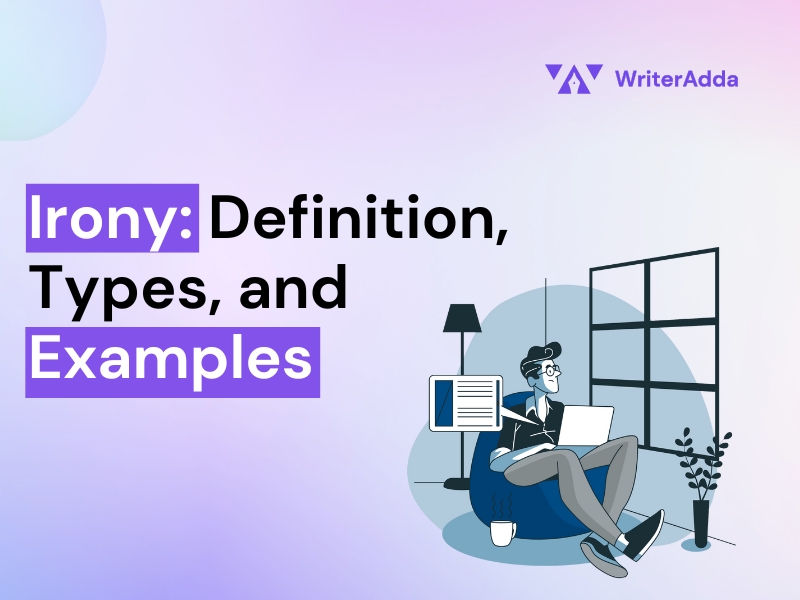Ever heard someone saying, “Oh great, just what I needed!” after hearing some bad news? Well, that’s an example of Irony. But Irony isn’t just limited to sarcasm or witty remarks. It’s a literary device that can add depth and complexity to the meaning of a statement, situation, or event.
Unfortunately, most of us tend to misuse or misunderstand Irony. We confuse it with coincidence, unpleasant surprises, and bad luck. So, if these things aren’t ironic, then what is?
To understand it better, let’s explore the definition of Irony, its examples, different types, and its use in literature.
Irony Definition and Examples
Irony is all about the difference between what we expect and what actually happens, whether it’s in what we say or do. You can spot Irony everywhere in books, speeches, everyday chats, and even in your own thoughts. Writers and speakers often use Irony to layer their messages, inviting us to “read between the lines.” It adds depth, humor, or even drama to their points. You’ll pick up on Irony when you notice how the language, tone, or context is being used.
For example: During a rainy day, you might say “What lovely weather!” while being drenched. This statement is ironic because the word “lovely” usually describes something positive, but in this case, it’s being used sarcastically to convey the opposite meaning.
Understanding Different Types of Irony
Irony comes in different forms, each with its unique purpose and effect. Here are the three most common types of Irony:
Dramatic Irony:
Dramatic Irony is when we, the audience or readers, know more about the story than the characters do. It’s like being in on a secret that the characters haven’t caught onto yet. This creates a fascinating gap between how we see the story and how the characters understand it. The protagonists might not grasp the full impact of their words or actions, but we do, and that lets us anticipate or worry about what’s coming next. This knowledge gap adds layers of tension, suspense, humor, and a dash of intrigue to the story.
A classic example of dramatic Irony can be found in Shakespeare’s “Hamlet.” The audience knows from the start that Hamlet’s uncle, Claudius, murdered his father to seize the throne. However, Hamlet remains in the dark about this for a significant portion of the play. This gap in knowledge keeps us on the edge of our seats as we watch Hamlet dig into his father’s death, ramping up the suspense and tension.
Another prime example of dramatic Irony is present in Sophocles’ ancient Greek play “Oedipus Rex.” Right from the start, the audience knows Oedipus is destined to kill his father and marry his mother, but poor Oedipus is clueless until the very end. This twist makes the whole situation even more intense!
Situational Irony:
Situational Irony is when an event or situation turns out to be the opposite of what we expect or predict. It’s like a cruel twist of fate that catches us off guard and sometimes even makes us laugh. Situational Irony isn’t just limited to stories; it also happens in our everyday lives. Think of a rainstorm on a wedding day or finding out that the expensive item you just bought is now on sale. These unexpected turns can be frustrating, hilarious, or even heartwarming.
When it comes to storytelling, situational Irony can also add depth and complexity to the plot.
One situational irony example in literature is a common theme in O. Henry’s short story “The Gift of the Magi.” This story revolves around a young couple, Jim and Della, who are desperately trying to buy each other Christmas gifts with their limited funds. In the end, they both sell their most prized possessions to buy gifts for each other. Ironically, these gifts become useless because of the sacrifices they made for each other.
Here are a few more examples of situational Irony:
- A fire station burning down due to a fire.
- A marriage counselor is filing for divorce.
- A police station is being robbed.
- A child therapist discovers that he is dead while trying to help a boy who sees dead people.
- A traffic cop is getting his license suspended for unpaid parking tickets.
- A pilot has a fear of heights.
- A member of PETA wearing leather shoes.
- An English teacher needs better grammar.
- A man needing medical assistance is being run over by an ambulance.
- A person who fears water falling into a pool while trying to avoid a water balloon.
Verbal Irony:
Verbal Irony is when someone says the opposite of what they really mean. It’s often used to express sarcasm, humor, or criticism. It’s like saying one thing but implying another. Verbal Irony relies heavily on tone and context, so it can be a bit tricky to identify in written texts.
For example, if someone says, “Wow, that’s just great!” in a sarcastic tone after hearing some bad news, they actually mean the opposite. A character in a movie might say, “Great, just what I needed,” after their car breaks down on the side of the road. Or a person may exclaim, “What a lovely weather we’re having!” during a hurricane.
Another example of verbal Irony in literature can be found in Mark Twain’s classic novel, “The Adventures of Huckleberry Finn.” Throughout the book, Huck constantly uses sarcasm and witty remarks to express his true emotions and thoughts. This adds depth and humor to his character and also serves as a commentary on society at that time.
Some other examples of verbal Irony include:
- Saying, “Wow, that’s just what I wanted,” when receiving an unwanted gift.
- Responding “Oh great” when someone cancels plans you weren’t looking forward to.
- Saying, “I love spending my entire weekend doing chores,” with a sarcastic tone.
- Responding “Thanks for nothing” when someone fails to help you.
The Role of Irony in Poetry:
Irony has been used in literature for centuries and has evolved over time.
In classical poetry, Irony was mainly used as a tool for satire and social commentary. Poets would use it to mock societal norms or expose hypocrisy within their communities. As poetry evolved into modernism and post-modernism movements, Irony took on new forms, becoming more subtle and layered.
Today, poets often use Irony as a way to explore complex emotions and ideas in their work. It can add depth and nuance to a poem, making the reader pause and reflect on the true meaning beneath the surface.
Example 1:
One modern poet known for his use of Irony is Billy Collins. In his poem “Litany,” he uses verbal Irony to challenge societal expectations placed upon women.
He writes,
“You are a woman who reads
because you love language”
(but then goes on to list other reasons society may assume a woman reads, such as)
“because you are alone.”
This use of Irony highlights the absurdity of these stereotypes and calls for change.
Example 2:
Another example of Irony in poetry is Sylvia Plath’s “Daddy,” where she uses situational Irony to portray her complicated feelings towards her father. The poem goes like this:
“You do not do, you do not do
Any more, black shoe
In which I have lived like a foot
For thirty years, poor and white,
Barely daring to breathe or Achoo.
Daddy, I have had to kill you.
You died before I had time–
Marble-heavy, a bag full of God,
Ghastly statue with one gray toe
Big as a Frisco seal.”
Plath uses situational Irony to transform her complex feelings about her father into something darkly humorous. This Irony comes from mixing deep grief with dark humor, like when she describes her father’s presence as a “black shoe” she’s worn for years. Plath’s emotions become even more complex as she deals with a sense of freedom from his memory, despite his death long ago. Her use of Irony highlights the absurd and tragic aspects of their relationship, making it both engaging and thought-provoking.
Example 3:
T.S. Eliot’s “The Love Song of J. Alfred Prufrock” is another famous poem that uses situational Irony to convey the narrator’s insecurity and fear of rejection. The title itself is ironic, as the speaker is anything but confident in love. Throughout the poem, he uses exaggerated language and self-deprecating humor to express his doubts and anxieties about romance.
For example, he says,
“I have heard the mermaids singing, each to each.
I do not think that they will sing to me.”
This use of Irony highlights the gap between his idealistic view of love and reality, making the reader empathize with his struggles.
Summarizing:
We can see that Irony is a powerful tool used in literature to add depth, humor, and complexity to a piece of content writing. It comes in many forms and has been used throughout history to convey different messages and themes. From classical poetry to modern works, Irony continues to be an effective device for engaging readers and making them think critically about the world around them.
So, next time you come across Irony in your reading, take a moment to appreciate its cleverness and impact on the work’s overall message. Who knows, you might even find yourself using it in your own writing!
Frequently Asked Questions
What is Irony?
Irony is a literary device that contrasts anticipation and reality, enhancing stories with unanticipated twists.
What are the different types of Irony?
The three major types of irony are situational (unexpected results), dramatic (the audience knows more than the characters), and verbal (sarcasm).
Could you please provide an example of Irony?
Yes! The use of verbal irony in Mark Antony's speech in "Julius Caesar," Situational irony in O. Henry's "The Gift of the Magi," and Dramatic irony in Romeo and Juliet are prime examples of Irony.
In what ways can Irony improve storytelling?
Irony adds layers of meaning by challenging preconceived notions, providing insight into human psychology, and captivating audiences with unexpected twists and turns.
What is the difference between situational Irony vs dramatic Irony?
Situational irony occurs when there is a discrepancy between what is expected to happen and what happens in a story; this typically results in a plot twist or a turn of events. Dramatic irony, on the other hand, occurs when the audience knows something that the characters don’t, which adds to the tension and builds anticipation for what happens next.




